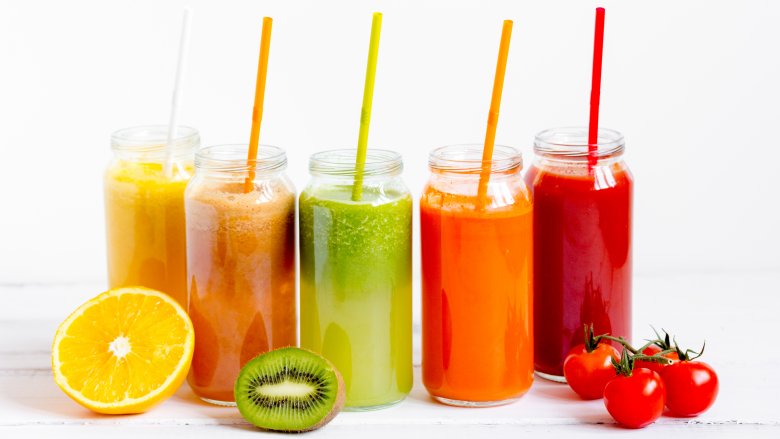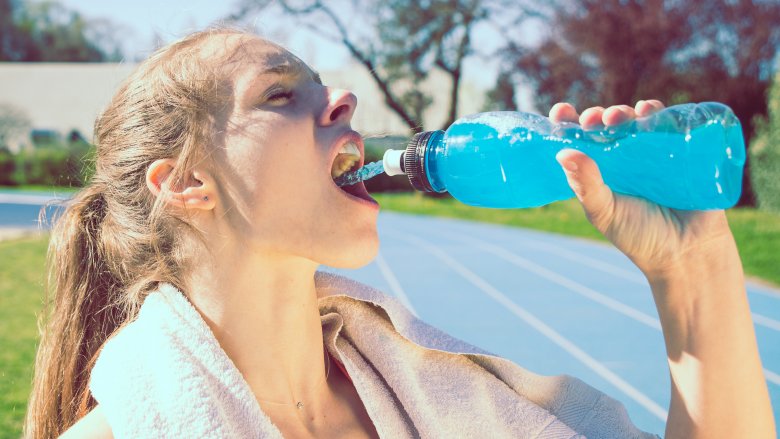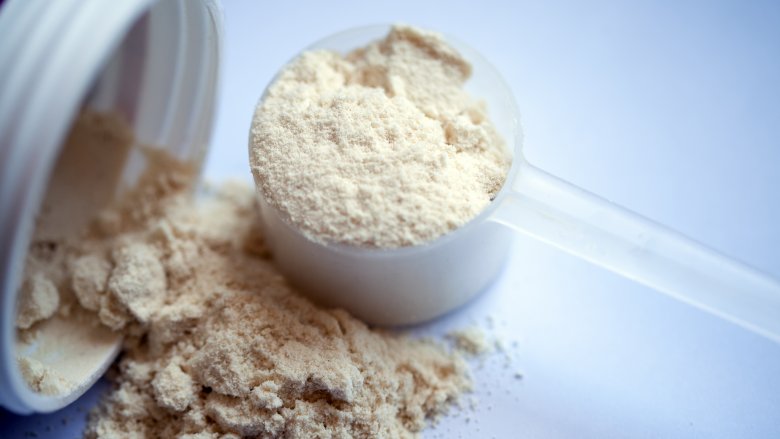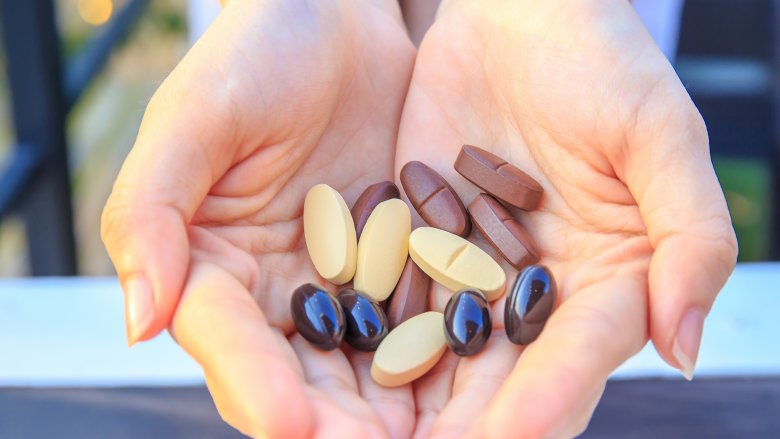100% fruit juice
When health mavens began extolling the virtues of freshly-pressed juice, lots of people began jumping on the juicing bandwagon. However, according to an article published in The Washington Post that was written by three nutrition experts, "the truth is that fruit juice, even if is freshly pressed, 100 percent juice, is little more than sugar water." This is particularly frustrating when, as The Washington Post notes, "we are inundated with the message that juice is healthy."
How does this happen, when whole fruit is healthy on its own? The authors of the article explain that by stripping fruits of their skin, connective membranes, and seeds, juicing also removes the fiber that helps slow absorption of the naturally-occurring sugars in whole fruit. This leads to insulin spikes, which can eventually lead to Type 2 diabetes.
Adding to which, fruit juice can be high in calories — and drinking your calories, as opposed to eating them, tends to keep your stomach from sending the "Hey, I'm full!" signal to your brain. This leads to overeating, which can contribute to weight gain. So, how can you drink juice and stay healthy? According to WebMD, it's important to emphasize vegetables in your juice blends. This helps limit the calories and sugar in the juice. An even better alternative is to skip the juice and go for a smoothie — you can add protein and almond milk, and blend full fruits and veggies so you'll consume the pulp that was removed during the juicing process.
Microwave popcorn
Popcorn is a fabulous low-calorie, high-fiber, healthy snack — unless it comes from the microwave. For everyone who relies on a bag of microwave popcorn to get them through the 2 p.m. slump at work: I feel your pain.
In May 2015, a group of environmental scientists released The Madrid Statement — published in the journal Environmental Health Perspectives with the support of the National Institutes of Health — expressing their concerns about a group of substances known as perfluorinated chemicals (PFCs, also called PFSAs). PFCs, which are "man-made and found everywhere," according to The Madrid Statement, are also highly toxic and degrade very slowly.
Used to make products waterproof and greaseproof, the inside of microwave popcorn bags are also usually coated with PFCs. As a result, according to an article published in Today Healthy Living, the environmental advocacy group EWG suggests it's best to "pop popcorn the old-fashioned way, on the stovetop."
Diet sodas and artificial sweeteners
For many people, trying to lose weight often involves switching from regular soda to its zero-calorie, diet version. Sadly for those of us who like Diet Coke, this isn't such a great idea: according to a study published in the Yale Journal of Biology and Medicine (YJBM), artificial sweeteners in diet sodas can be problematic. "Intuitively, people choose non-caloric artificial sweeteners over sugar to lose or maintain weight," notes the YJBM. "Whether due to a successful marketing effort on the part of the diet beverage industry or not, the weight-conscious public often consider artificial sweeteners 'health food.'"
However, evidence is starting to show that artificial sweeteners may be correlated with weight gain and obesity in both children and adults. In fact, according to a meta analysis of research published in the Canadian Medical Association Journal, consumption of artificial sweeteners was associated with an increase in health indicators like waist circumference, obesity, hypertension, Type 2 diabetes, and cardiovascular disease.
As the YJBM notes, research suggests that this is because artificial sweeteners don't activate the brain's food reward pathways — the processes that help us feel satisfied after eating something sweet — the way natural sweeteners do. This can lead to increased appetite and sugar cravings, and you can see where this goes: straight to the ice-cream sandwiches. So, while consuming a lot of sugar isn't a great idea, it's best to cut out the diet foods and rely on natural sweeteners (like honey and maple syrup) in smaller amounts.
Advertisement
Sports drinks
For many of us who grew up in the '80s and '90s, the go-to recovery drink after every after school sports practice, and during every game, was some sort of sports drink like Gatorade or Powerade. It turns out that this wasn't such a grand plan after all: according to a report published by the University of California at Berkeley's Atkins Center for Weight and Health, even though sports drinks are marketed as ideal sources of rehydration that are "health and strength enhancing," they don't live up to the hype.
Not only do they fall short of marketing promises, but they can actually be detrimental to people's health. As the report notes, "These beverages are often fortified with added nutrients that are advertised as providing health benefits…. However, the sugar content and potential adverse effects of some additives outweigh any potential benefit those ingredients provide, especially among youth."
Even though sports drinks are meant to be consumed by athletes exercising strenuously for over an hour, it turns out that most of the people drinking them "are — more than anything — drawn to the marketing of these products, who have been convinced they need to replace their electrolytes," Harold Goldstein, the executive director of the California Center for Public Health Advocacy, told KQED News. So if you go for a long, summertime run outside, then by all means, fuel up on Gatorade — but for anything less than prolonged exertion with intense sweating, stick to water.
Soy protien
Soy has become a controversial topic in the last few years, with some people demonizing it and others saying it's healthy. According to Shape magazine, the evidence is mixed: "for every health benefit of the complete plant-based protein source, you'll also hear of a potential detrimental effect… however, because soy products come in such a wide variety — whole soy, fermented soy, soy protein isolate, and others — confusion continues to ensue."
While whole soy (such as tofu) and fermented soy (such as miso), are generally believed to be healthy, soy protein isolate seems to be the biggest offender. A heavily processed derivative of defatted soy flour, soy protein isolate is a popular way to add protein to, or improve the texture of, many pre-made foods, and it shows up in a lot of unexpected places.
Because of this, most people are probably consuming a lot of soy without even knowing it — and clinical nutritionist Sara Vance told Refinery29 that one downside of heavy soy consumption is possible mineral deficiencies. "Soy products are very high in phytic acid, which can interfere with mineral absorption…. Whereas soaking and sprouting other grains and legumes can remove the phytic acid, that does not work with soy, and the only way to neutralize the phytic acid in soy is to ferment it," she said.
Nutrition bars
For people who are constantly on the go, nutrition bars can offer a quick, conventient, and easily portable source of calories and nutrition (because nothing good comes from being hangry in a meeting). However, according to WebMD, "not all bars are created equal."
Registered Dietitian Dawn Jackson, spokeswoman for the American Dietetic Association, agrees with this idea, telling WebMD that "some of the bars have as much sugar and as much saturated fat as a candy bar. So use them in moderation." It's also important not to let bars push whole foods out of your diet or rely on them at the exclusion of anything else, since no one food can give you the full array of vitamins and nutrients that your body needs.
Another key to healthy nutrition bars is to look carefully at what's in each one, since ingredients can include things like the soy protein isolate discussed above, lots of sweeteners, or fillers instead of fiber. And, as WebMD also notes, "some are nothing more than glorified candy bars." When reading the label, be sure to look at the back of the packaging (this is where the actual information is, as opposed to the marketing hype trying to make you believe it'll turn you into Gal Gadot), and look for something that has 220-230 calories, less than five grams of fat, three to five grams of fiber, 10-15 grams of protein, and as few sweeteners as possible.
Advertisement
Low-fat and fat-free foods
Among the various foibles of decades past — including gems like mullets, polyester leisure suits, and eyebrows plucked within a millimeter of their existence — lies the idea that low-fat and fat-free foods are super healthy. As it turns out, the nutrition mantra of the '90s was totally wrong.
According to CBS News, a Tufts University study showed that "people who consumed full-fat dairy products had as much as a 46 percent lower risk of developing diabetes" compared to people who ate low-fat and non-fat dairy. A second study, which tracked both diet and the incidence of mortality and major cardiac events among people in 18 countries, found that "high carbohydrate intake was associated with higher risk of total mortality, whereas total fat and individual types of fat were related to lower total mortality."
So why are reduced and non-fat products on the outs? It largely boils down to taste (pun intended). According to WebMD, low-fat and fat-free foods often lose flavor when the fat is extracted. So, to compensate for the lack of flavor, "food makers tend to pour other ingredients — especially sugar, flour, thickeners, and salt — into the products. That can add calories." In fact, research has shown that higher fat foods tend to be more satiating than lower fat foods and can lead to greater weight loss than high-carb/low-fat diets. So, while it doesn't give us all license to slather everything in butter, we definitely shouldn't fear fat.
Multivitamins
any of us grew up thinking that more is better when it comes to vitamins — think of those ultra-mega-super-vitamins you see in supplement stores — but recent evidence suggests that this isn't the case. Dr. Paul Offit, a researcher at the Children's Hospital of Philadelphia, told NPR that a 1994 law exempts dietary supplements and vitamins from tighter regulation and oversight by the Federal Drug Administration (FDA). Offit notes that this means supplements can make claims about health benefits that they may not have.
Worse, though, is that recent data indicates that getting too much beta-carotene, vitamin E, and vitamin A can be detrimental to your health, particularly in older age. So what's the best course of action? The American Heart Association recommendations are straightforward: eat healthy foods. While supplements can help, "the key to vitamin and mineral success is eating a balanced diet." This is because "foods provide many bioactive compounds and dietary fiber that typically aren't found in supplements."
If you're eating a healthy diet and still deficient (the most common deficiencies for women include iron, calcium, and vitamin D), then supplementation is okay — but experts insist that we try to get our vitamins and minerals from food as much as possible.
Clean eating
The upshot of most of this research is that it's best to rely on whole, unprocessed foods. Because of this, "clean eating" — the all-encompassing term for trying to eat more unrefined, whole foods — has become enormously popular in recent years. An article in The Guardian notes that a justifiable anxiety about food is one of the primary forces driving the clean eating trend: we're "living in an environment where ordinary food, which should be something reliable and sustaining, has come to feel noxious." Seeing the slew of afflictions associated with post-WWII nutrition, such as heart disease and diabetes, many people became "understandably scared of the modern food supply and what it was doing to our bodies."
However, clean eating becomes a problem comes when it morphs into an obsession. Orthorexia, which the American Psychiatric Association describes as "a term used to describe a dietary pattern in which an individual restricts intake to include only 'healthy' foods, such as vegetables or organic foods, but in doing so develops significant problems, such as an obsession with food and severe weight loss," is increasingly prevalent in developed countries.
While orthorexia usually starts out as a well-intentioned effort to eat more healthy foods, the infusion of moral value into foods — such as clean or dirty — can lead to an obsession with only eating healthy, "virtuous" foods. So, while clean eating can be useful, red flags include "a restrictive diet, ritualized patterns of eating, and rigid avoidance of foods believed to be unhealthy or impure."
Advertisement
Tukey
If you don't buy organic turkey and just opt for what is in the grocery store or on the menu, you may be getting a healthy dose of arsenic. It's hard to believe that something lethal would be put in poultry, but it's actually quite handy at preventing parasitic infections. The National Chicken Council has stopped using any arsenic-based drugs because of bad press regarding all the chicken Americans consume. However, the National Turkey Federation is under different guidelines and still gives turkeys the old drug regime during the first few weeks of their lives and in summer months. It's not in all turkey, as it's banned in the European Union, but it is still in American turkey meat.
Arsenic just sounds bad, but to recap, it can cause cancer or death when exposure is too high. Prolonged ingestion can also hurt many body parts, including the skin, gut, blood vessels, immune system, lungs, heart, urinary system, reproductive organs, and the nervous system.
Advertisement
Advertisement
Advertisement












